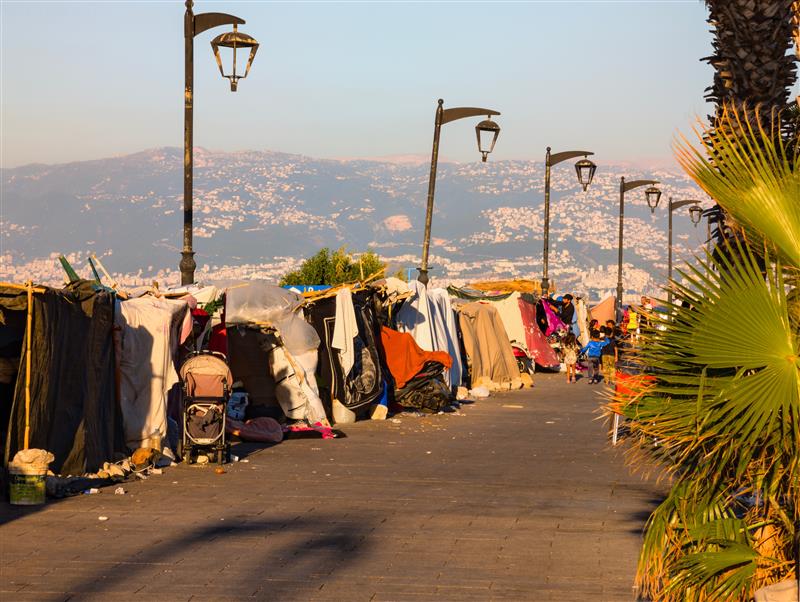Since October 2024, the outbreak of hostilities between Israel and Lebanon has triggered a severe internal displacement crisis, particularly in Lebanon’s southern regions, with over 1.2 million individuals displaced. Although a fragile ceasefire is in place, clashes have continued along the southern border, and sporadic attacks have reached the southern suburbs of Beirut. The ongoing Israeli-Iranian war threatens to undermine the ceasefire and further increase instability.

In this context, the provision of social assistance to internally displaced people (IDPs) has become a critical concern, exposing the limitations of Lebanon’s state-based social assistance system in supporting IDPs. Decades of political instability, economic collapse, and the erosion of public institutions have severely constrained the state’s ability to provide adequate aid. During the 2006 six-day war with Israel, large-scale cash assistance programmes were deployed by international governments and humanitarian organisations, including those supported by Iran. This time around the government response has been markedly limited and primarily based on local, familial and community response.
In response to the war, the Lebanese Ministry of Environment converted public buildings into shelters, while the Ministry of Social Affairs distributed emergency cash aid through the NPTP/ESSN program; however, these efforts only reached 18,640 of the poorest households in early 2024.
International organisations also stepped in to address the gaps in state provision. UNHCR, Save the Children and ICRC provided cash for shelter and protection, immediate relief items, medical care, legal and other assistance while the International Organization for Migration(IOM), in cooperation with the Lebanese government, distributed mattresses and blankets. However, the scale of displacement far outpaced the resources and capacity of these actors, raising concerns around sustainability and equitable access to assistance.
In the absence of a comprehensive state response and limited donor support, local non-state actors—including NGOs, municipal unions, and community groups—have assumed a critical role in addressing urgent needs through smaller-scale initiatives. Local municipalities in the south and the union of municipalities in the southern suburbs of Beirut, areas primarily affected by heavy bombardments, facilitated transportation, identified temporary shelters in public buildings, and provided basic necessities such as food, heating materials, and medical assistance. Local authorities, particularly in southern Lebanon, have coordinated the reception and accommodation of displaced families.
Extended family networks supported IDPs, from individual generosity to community projects. In Saida, Dr. Ali Jaradeh turned his dental clinic into a kitchen for displaced families. In Beirut’s Badaro, mothers transformed a daycare into a hub for collecting and distributing clothing, blankets, and infant formula (Alaraby, 2024). The “Coat” campaign by Hani Fahs Foundation distributed around 1,200 food parcels, 3,000 blankets, and 15 heaters to help displaced during winter. Engineers Ziad Abi Shaker and Ziad Abi Chaker initiated projects providing mattresses, blankets, pillows, and emergency cash, including for baby products and medicines.
Recent interviews for the Better Assistance in Crises Research programme (BASIC Research) reinforce the importance of recognising and investing in local responses to displacement and social assistance, particularly when state-led systems are absent or overwhelmed. As Mr. L.A from the Union of Municipalities in Southern Suburbs of Beirut explained, during the escalation of conflict in 2024, local actors—including the municipality and affiliated networks—mobilised rapidly to provide temporary housing, cash assistance, and healthcare support to newly displaced populations. These efforts were often heavily reliant on community knowledge, personal relationships, and local coordination mechanisms, frequently filling the gap left by centralised aid systems and formal humanitarian actors. He noted that aid from international organisations was “negligible,” leaving local authorities and NGO’s to absorb the strain.
Lebanon faces ongoing threats of war, making strong social support systems crucial. Overstretched state agencies and limited centralized responses to displacement mean local efforts—led by municipalities, civil society, and informal groups—are vital yet often overlooked. These decentralized initiatives help reach displaced and disabled populations despite limited resources and inconsistent aid. As international support wanes, strengthening local capacities is essential to ensure aid reaches those in need and to maintain social cohesion. Recent research shows that the fragmentation of aid and weak national systems highlight the importance of local responses in Lebanon.
The BASIC Research project Geographies of Social Assistance, investigates the spatial dynamics of social assistance programs in Beirut’s urban informal settlements, in collaboration with Acted and World Vision Lebanon, as part of a broader effort to understand the politics of social assistance in Lebanon.
A Working Paper, “Social assistance in Beirut’s informal neighbourhoods: nationality and locality effects”, will be published in the Autumn. Other research from the programme is available in an IDS OpenDocs collection here and you can follow our page on LinkedIn for regular updates.
